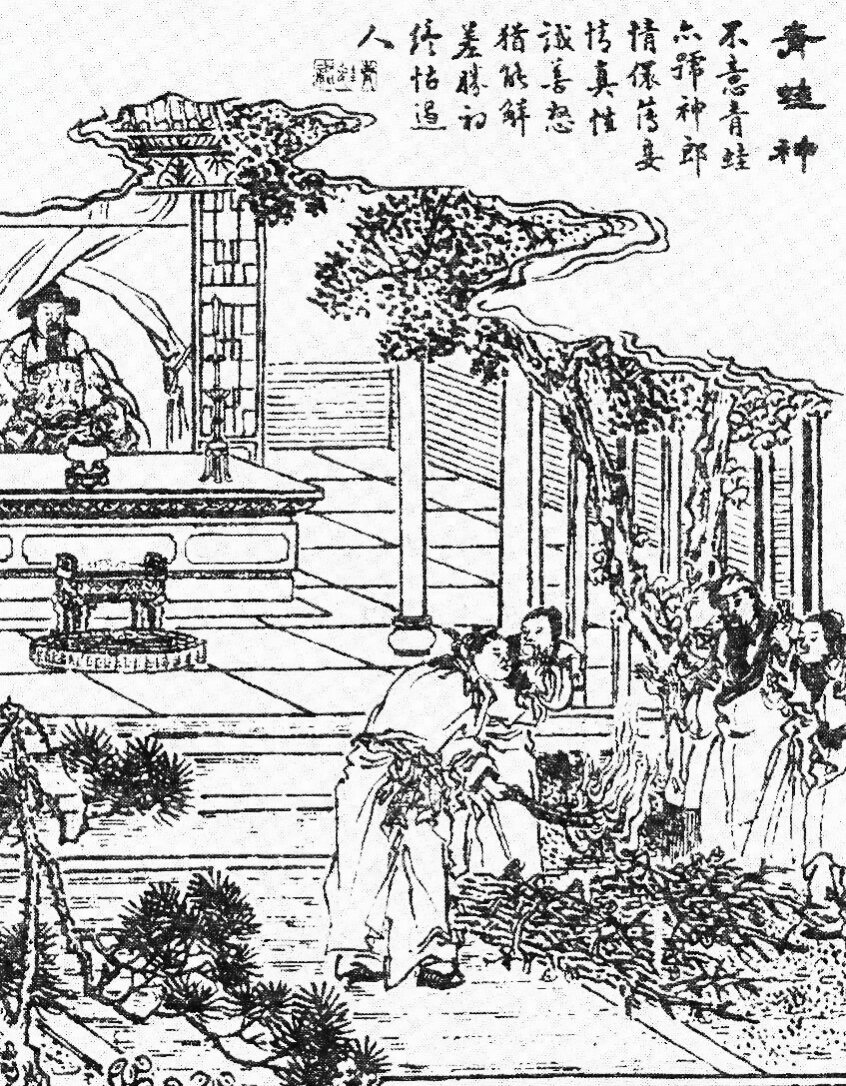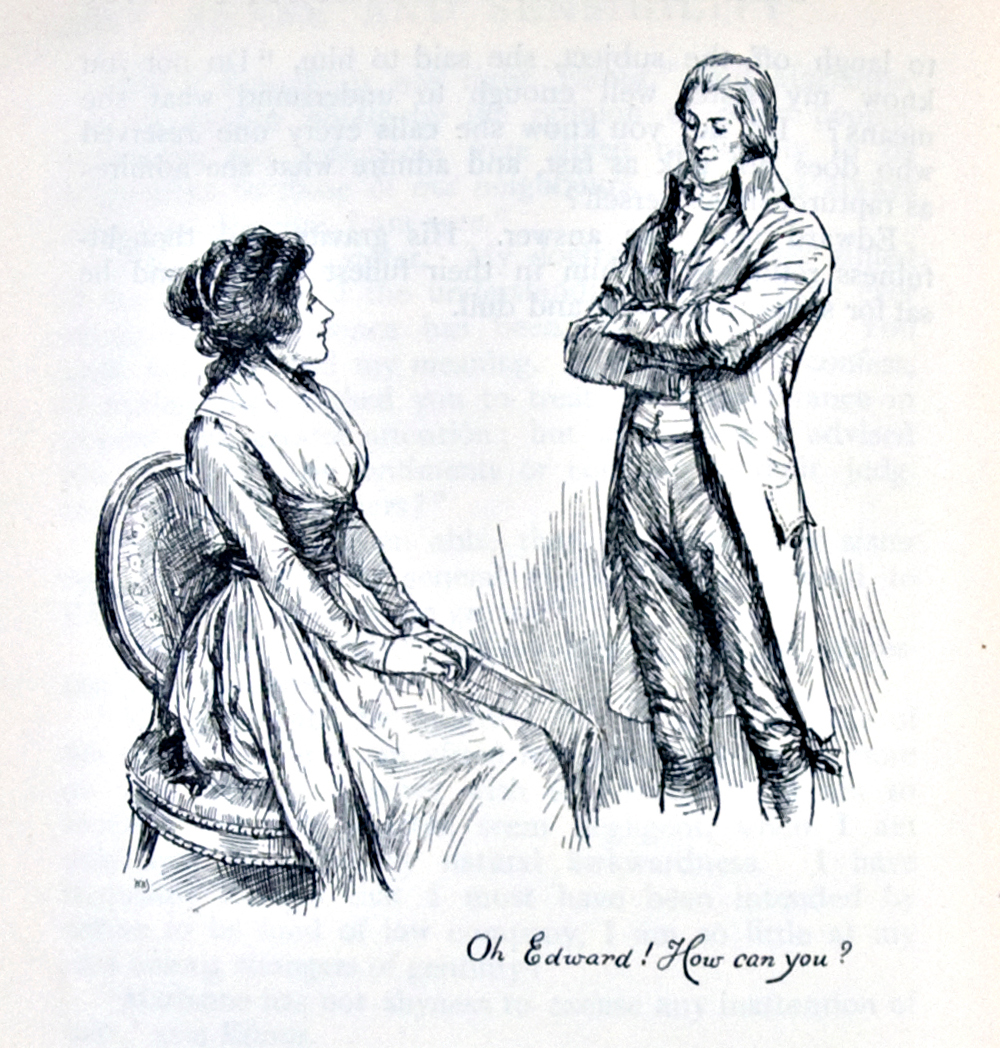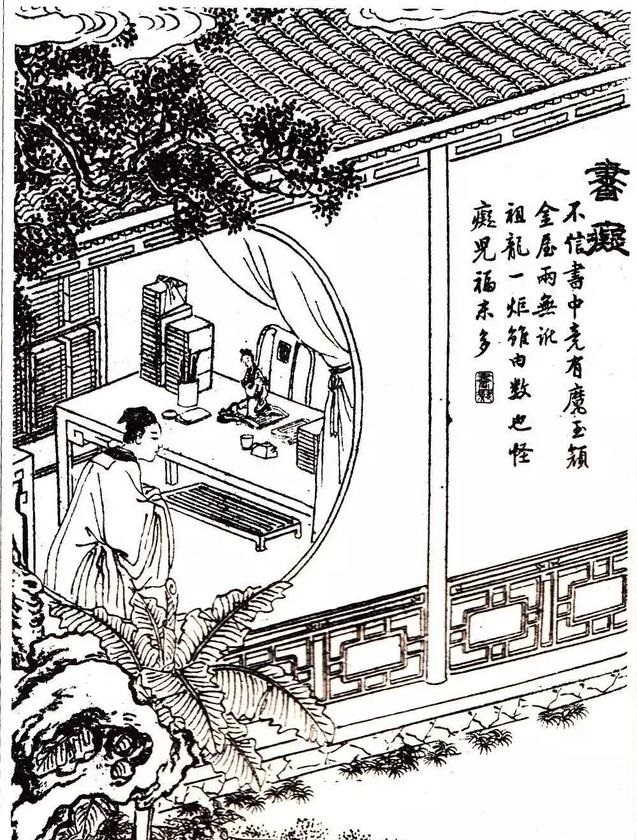|
The Frog God
"The Frog God" () is a short story by Pu Songling collected in '' Strange Stories from a Chinese Studio'' (1740). It revolves around a Chinese bachelor who encounters the locally revered frog god and his subsequent romance with its daughter. The titular frog deity makes an immediate reappearance in the following story, a semi-sequel simply titled "You" () in Chinese or "Another Frog God Tale" in the 2014 English translation by Sidney L. Sondergard. Plot The pious people who reside in the Han river region in Hubei, China, live in fear of the almighty Frog God, who is worshipped at a frog-filled temple specially dedicated to him. The Frog God possesses divine powers and can communicate with others in their dreams. Xue Kunsheng (薛昆生), a young bachelor, is selected by the Frog God to be his daughter's future spouse; the Xue family disregards this and some time later arrange for Kunsheng to take the Jiang family's daughter as his wife. The Frog God is infuriated and the Jiang fam ... [...More Info...] [...Related Items...] OR: [Wikipedia] [Google] [Baidu] |
WikiProject Novels
A WikiProject, or Wikiproject, is a Wikimedia movement affinity group for contributors with shared goals. WikiProjects are prevalent within the largest wiki, Wikipedia, and exist to varying degrees within sister projects such as Wiktionary, Wikiquote, Wikidata, and Wikisource. They also exist in different languages, and translation of articles is a form of their collaboration. During the COVID-19 pandemic, CBS News noted the role of Wikipedia's WikiProject Medicine in maintaining the accuracy of articles related to the disease. Another WikiProject that has drawn attention is WikiProject Women Scientists, which was profiled by '' Smithsonian'' for its efforts to improve coverage of women scientists which the profile noted had "helped increase the number of female scientists on Wikipedia from around 1,600 to over 5,000". On Wikipedia Some Wikipedia WikiProjects are substantial enough to engage in cooperative activities with outside organizations relevant to the field at issue. For e ... [...More Info...] [...Related Items...] OR: [Wikipedia] [Google] [Baidu] |
The Frog God
"The Frog God" () is a short story by Pu Songling collected in '' Strange Stories from a Chinese Studio'' (1740). It revolves around a Chinese bachelor who encounters the locally revered frog god and his subsequent romance with its daughter. The titular frog deity makes an immediate reappearance in the following story, a semi-sequel simply titled "You" () in Chinese or "Another Frog God Tale" in the 2014 English translation by Sidney L. Sondergard. Plot The pious people who reside in the Han river region in Hubei, China, live in fear of the almighty Frog God, who is worshipped at a frog-filled temple specially dedicated to him. The Frog God possesses divine powers and can communicate with others in their dreams. Xue Kunsheng (薛昆生), a young bachelor, is selected by the Frog God to be his daughter's future spouse; the Xue family disregards this and some time later arrange for Kunsheng to take the Jiang family's daughter as his wife. The Frog God is infuriated and the Jiang fam ... [...More Info...] [...Related Items...] OR: [Wikipedia] [Google] [Baidu] |
Pu Songling
Pu Songling (, 5 June 1640 – 25 February 1715) was a Chinese writer during the Qing dynasty, best known as the author of '' Strange Tales from a Chinese Studio'' (''Liaozhai zhiyi''). Biography Pu was born into a poor merchant family from Zichuan (淄川, in Zibo, Shandong). At the age of 18, he received the Xiucai degree in the Imperial examination. It was not until he was 71 that he was awarded the '' Gongsheng'' ("tribute student") degree for his achievement in literature rather than for passing the Imperial examinations. He spent most of his life working as a private tutor, collecting the stories that were later published in '' Strange Tales from a Chinese Studio'' in 1740. Some critics attribute the Vernacular Chinese novel ''Xingshi Yinyuan Zhuan'' ("Marriage Destinies to Awaken the World") to him. Translations of his work * ''Strange Tales from Liaozhai'' (tr. Sidney L. Sondergard). Jain Pub Co., 2008. . * ''Strange Tales from a Chinese Studio'' (tr. John Minford). ... [...More Info...] [...Related Items...] OR: [Wikipedia] [Google] [Baidu] |
Zhiguai
''Zhiguai xiaoshuo'', translated as "tales of the miraculous", "tales of the strange", or "records of anomalies", is a type of Chinese literature which appeared in the Han dynasty and developed after the fall of the dynasty in 220 CE and in the Tang dynasty in 618 CE. They were among the first examples of Chinese fiction and deal with the existence of the supernatural, rebirth and reincarnation, gods, ghosts, and spirits. Robert Ford Campany sees the genre loosely characterized in its early examples by relatively brief form, often only a list of narrations or description, written in non-rhyming classical prose with a "clear and primary" focus on things which are anomalous, with a Buddhist or Taoist moral. Campany, however, does not see the stories as "fiction," since the literati authors believed that their accounts were factual. Lydia Sing-Chen Chiang suggests that one function of the stories in this genre was to provide a "context by which the unknown may be ascribed names and ... [...More Info...] [...Related Items...] OR: [Wikipedia] [Google] [Baidu] |
Romance Novel
A romance novel or romantic novel generally refers to a type of genre fiction novel which places its primary focus on the relationship and romantic love between two people, and usually has an "emotionally satisfying and optimistic ending." Precursors include authors of literary fiction, such as Samuel Richardson, Jane Austen, and Charlotte Brontë. There are many subgenres of the romance novel, including fantasy, gothic, contemporary, historical romance, paranormal fiction, and science fiction. Although women are the main readers of romance novels a growing number of men enjoy them as well. The Romance Writers of America cite 16% of men read romance novels. "Many people today don’t realize that romance is more than a love story. Romance can be a complex plotline with a setting from the past in a remote, faraway place. Instead of focusing on a love story, it idealizes values and principles that seem lost in today’s world of technology and instant gratification. However, roma ... [...More Info...] [...Related Items...] OR: [Wikipedia] [Google] [Baidu] |
Strange Stories From A Chinese Studio
''Liaozhai zhiyi'', sometimes shortened to ''Liaozhai'', known in English as ''Strange Tales from a Chinese Studio'' or ''Strange Stories from a Chinese Studio'', is a collection of Classical Chinese stories by Qing dynasty writer Pu Songling, comprising close to 500 stories or "marvel tales" in the ''zhiguai'' and ''chuanqi'' styles, which according to some critics, served to implicitly criticise societal problems. Written in the late 1600s, its earliest publication date is given as 1740. Since then, many of the critically lauded stories have been adapted for other media such as film and television. Publication history Pu is believed to have completed the majority of the tales sometime in 1679, when he wrote the preface to the anthology, though he could have added entries as late as 1707. However, according to Chinese scholar Zhang Peiheng (), the original ''Liaozhai'' comprised eight volumes, the earliest and latest of which were completed around 1681 and 1707 to 1714 respect ... [...More Info...] [...Related Items...] OR: [Wikipedia] [Google] [Baidu] |
The Great Sage, Heaven's Equal
"The Great Sage, Heaven's Equal" () is a short story by Pu Songling first published in ''Strange Stories from a Chinese Studio'' (1740). It revolves around Shandong native Xu Sheng, who initially rejects the existence of Sun Wukong but gradually becomes a firm devotee of him after encountering him and experiencing his power. The story acts as social commentary on the worship of mythical characters, in this case Sun Wukong. In 2014, it was translated into English by Sidney L. Sondergard. Background Sun Wukong first appeared in the 16th-century Chinese classical novel ''Journey to the West'' by Wu Cheng-en. In the novel he is also referred to as "Great Sage, Heaven's Equal" and "Handsome Monkey King". Wu's character was well-received, to the point that some regarded him as a real god. During Pu's time, actual and genuine Sun Wukong shrines were already in existence or emerging, as part of "(t)he cult of this divine monkey". In a larger phenomenon, works of fiction contributed to th ... [...More Info...] [...Related Items...] OR: [Wikipedia] [Google] [Baidu] |
Another Frog God Tale
*
{{disambiguation ...
Another or variant may refer to: * anOther or Another Magazine, culture and fashion magazine * ''Another'' (novel), a Japanese horror novel ** ''Another'' (film), a Japanese 2012 live-action film based on the novel * Another River, a river in the U.S. state of Alaska * A. N. Other, a pseudonym See also * Yet another * Indefinite pronoun * English determiners * Other (other) * Others (other) Others or The Others may refer to: Fictional characters * Others (''A Song of Ice and Fire''), supernatural creatures in the fictional world of George R. R. Martin's fantasy series ''A Song of Ice and Fire'' * Others (''Lost''), mysterious inh ... [...More Info...] [...Related Items...] OR: [Wikipedia] [Google] [Baidu] |
Short Story
A short story is a piece of prose fiction that typically can be read in one sitting and focuses on a self-contained incident or series of linked incidents, with the intent of evoking a single effect or mood. The short story is one of the oldest types of literature and has existed in the form of legends, mythic tales, folk tales, fairy tales, tall tales, fables and anecdotes in various ancient communities around the world. The modern short story developed in the early 19th century. Definition The short story is a crafted form in its own right. Short stories make use of plot, resonance, and other dynamic components as in a novel, but typically to a lesser degree. While the short story is largely distinct from the novel or novella/short novel, authors generally draw from a common pool of literary techniques. The short story is sometimes referred to as a genre. Determining what exactly defines a short story has been recurrently problematic. A classic definition of a short story ... [...More Info...] [...Related Items...] OR: [Wikipedia] [Google] [Baidu] |
Han River (Shaanxi And Hubei)
The Han River, also known by its Chinese names Hanshui and Han Jiang, is a left tributary of the Yangtze in central China. It has a length of and is the longest tributary of the Yangtze system. The river gave its name to the Han dynasty and, through it, to the Han Chinese, the dominant ethnicity in China and the most populous ethnic group in the world. It is also the namesake of the city of Hanzhong on its upper course. Geography The headwaters of the Han flow from Mount Bozhong in southwestern Shaanxi. The stream then travels east across the southern part of that province. Its highland valley—known as the Qinba Laolin—divides and is protected by the Qinling or Qin Mountains to its north and the Dabashan or Daba Mountains to its south. The main cities are Hanzhong in the west and Ankang in the east. It then enters Hubei. It crosses most of Hubei from the northwest to the southeast, flowing into the Yangtze at the provincial capital Wuhan, a city of several million inhabi ... [...More Info...] [...Related Items...] OR: [Wikipedia] [Google] [Baidu] |
Hubei
Hubei (; ; alternately Hupeh) is a landlocked province of the People's Republic of China, and is part of the Central China region. The name of the province means "north of the lake", referring to its position north of Dongting Lake. The provincial capital, Wuhan, serves as a major transportation hub and the political, cultural, and economic hub of central China. Hubei's name is officially abbreviated to "" (), an ancient name associated with the eastern part of the province since the State of E of the Western Zhou dynasty of –771 BCE; a popular name for Hubei is "" () (suggested by that of the powerful State of Chu, which existed in the area during the Eastern Zhou dynasty of 770 – 256 BCE). Hubei borders the provinces of Henan to the north, Anhui to the east, Jiangxi to the southeast, Hunan to the south, Chongqing to the west, and Shaanxi to the northwest. The high-profile Three Gorges Dam is located at Yichang, in the west of the province. Hubei is the 7th-largest p ... [...More Info...] [...Related Items...] OR: [Wikipedia] [Google] [Baidu] |
The Bookworm (short Story)
"The Bookworm" () is a short story by Pu Songling first published in ''Strange Stories from a Chinese Studio'' (1740). The story revolves around an innocent scholar Lang Yuzhu and his romantic encounter with a celestial being hidden in his books. An English translation of the story by Sidney L. Sondergard was released in 2014. Background "The Bookworm" is a "fictional extension" of a poem titled ''Quanxueshi'' () and written by Emperor Zhenzong, which highlights the importance of being well-read and learned. Parts of the poem are cited in "The Bookworm", most notably "There (in books), girls as beautiful as jade abound." Originally titled "Shuchi" (书痴) by Pu Songling, the full story was translated into English by Sidney L. Sondergard as "The Bookworm" in 2014. The Martin Bodmer Foundation Library houses a 19th-century ''Liaozhai'' manuscript, silk-printed and bound ''leporello''-style, that contains three tales including "The Bookworm", "The Great Sage, Heaven's Equal", and "T ... [...More Info...] [...Related Items...] OR: [Wikipedia] [Google] [Baidu] |



.jpg)
